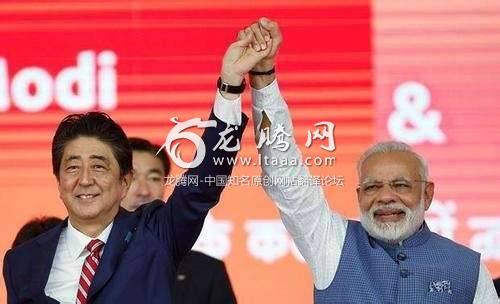身为亚洲最强大的三个国家,为何印度和日本互为好友,而中国却不能和日印成为朋友? [美国媒体]
中国,日本以及印度最近一系列的外交会晤凸显了三个亚洲大国之间复杂并且时常显得矛盾的外交关系。
OF ASIA’S BIG 3, INDIA AND JAPAN CAN BE FRIENDS. WHY NOT CHINA?
身为亚洲最强大的三个国家,为何印度和日本互为好友,而中国却不能和日印成为朋友?
The recent string of diplomatic encounters between China, Japan and India underscores the complex and often contradictory relationship shared by Asia’s three largest powers.
中国,日本以及印度最近一系列的外交会晤凸显了三个亚洲大国之间复杂并且时常显得矛盾的外交关系。
Indian Prime Minister Narendra Modi’s visit to Japan and meetings with Shinzo Abe this week came hot on the heels of the Japanese leader’s talks with Chinese President Xi Jinping and Premier Li Keqiang from October 25 to 27
在日本领导人安倍晋三于10月25日至27日期间和中国领导层展开会谈之后,印度总理纳伦德拉莫迪于本周访问了日本,并与安倍晋三展开会晤。
Economically speaking, there is great potential for cooperation between the trio, because their economies are basically complementary by nature.In a globalised world, Japan, a developed industrial power, China, an emerging economy, and India, the world’s largest underdeveloped economy, can each play their respective roles in production and supply. Just as China followed Japan’s export-oriented development model over the past few decades, so too is India mimicking China’s.
从经济角度上,三个国家之间合作的潜力是十分巨大的,因为三国的经济从本质上来讲是可以互补的。在这个全球化的世界里,日本是一个发达的工业大国;中国则是一个新兴经济体;而印度则是世界上最大的不发达经济体。这三个国家可以在生产和供应中分别扮演各自的角色。正如中国在过去几十年里遵循了日本的出口导向发展模式,印度也在效仿着中国的发展模式。
Diplomatically speaking, the trio are equally responsible for maintaining regional stability and global peace. And historically speaking, all three share the common goal of realising the so-called Asian century or Pacific century by the year 2100.
从外交角度上来看,三国都对维护地区稳定以及世界和平负有同样的责任。从历史角度上来看,这三个国家都有一个共同的目标,那就是在2100年之前将世界带向所谓的亚洲世纪(又或者是太平洋世纪)。
But in real politics, there are growing rivalries between China and Japan, and China and India.
但在现实政治中,中日以及中印之间的竞争则正变得日益激烈。
New Delhi and Tokyo are emerging as strategic allies, bonded by the shared grievances and concern about China’s fast rise and its increased assertiveness in diplomatic and international security issues.Both are at odds with China over territorial disputes, which Beijing holds as “core national interests”. And as Asia’s most vibrant and largest democracies, Japan and India are more likely to share common ground than in their respective ties with China, simply because there are fewer ideological obstacles.
新德里和东京正逐渐成为战略盟友,这两个国家都对中国的快速崛起以及他们逐渐增强的外交魄力感到不满和担忧。两个国家都与中国在领土争端问题上存在着分歧,中国政府更视领土问题为“核心的国家利益”。作为亚洲最具活力和规模最大的两个民主国家而言,日本和印度两国之间更容易达成共识,毕竟两国之间的意识形态障碍较少。
Beyond the diplomatic pomp and ceremony, Abe’s China visit achieved very little, focusing only on cooperation in economics and trade. But the Japanese PM’s meeting with Modi was clearly a meeting of far closer allies.Modi and Abe shared warm bear hugs, and they referred to each other as New Delhi’s “most trusted partner” and one of Japan’s “most dependable friends”. Their talks also went deeper, with both sides agreeing to strengthen ties in the areas of security and geopolitics.
撇去那些隆重的外交仪式来看,安倍的中国之行实际上收效甚微,并且只聚焦在经贸合作方面。相较而言,日本首相与莫迪的会晤则显然是一场亲密得多的盟友之间的会晤。莫迪和安倍在会面时热情地熊抱了对方,印度声称日本是其“最信任的朋友”,日本则称印度为“最可靠的朋友之一”,双方会谈的内容也更加的深入,两国同意加强彼此在安全和地域政治方面的联系。
This week’s events and the increasingly close Tokyo-New Delhi partnership are sure to stoke Chinese anxieties. The world is witnessing an emerging alliance of “like-minded” free democracies, led by the US, to counter-check China’s so-called challenge to the liberal-capitalist international order, which has been led by America since the end of the second world war
本周的一系列时间,以及东京-新德里之间日益紧密的伙伴关系肯定会引发中国方面的忧虑。世界正在见证一个由美国领导的、由“志同道合”的西式民主国家组成的新兴联盟,它将抗衡中国对资本主义国际社会的“挑战”。而自二战结束以来,这种资本主义国际秩序一直都是由美国所领导着的。
TigerJ
Has anyone ever rushed to do business in India because if its "democracy and rule of law" ?
是否有人因为轻信了印度的“民主和法治”就急切的跑去印度做生意?
kkng0819
If the 3 nations should set aside their political differences and enhance their trade relationship for the benefits of Asia
如果这三个国家能抛开政治分歧,并为了亚洲的利益而加强贸易关系就好了。
cicero
Both India and Japan have false democracy. They have shared values of lying, looting and raping.
印度和日本都有着虚假的民主制度,他们在说谎,抢劫和强奸方面有着共同的价值观。
版权声明
我们致力于传递世界各地老百姓最真实、最直接、最详尽的对中国的看法
【版权与免责声明】如发现内容存在版权问题,烦请提供相关信息发邮件,
我们将及时沟通与处理。本站内容除非来源注明五毛网,否则均为网友转载,涉及言论、版权与本站无关。
本文仅代表作者观点,不代表本站立场。
本文来自网络,如有侵权及时联系本网站。
图文文章RECOMMEND
热门文章HOT NEWS
-
1
Why do most people who have a positive view of China have been to ...
- 2
- 3
- 4
- 5
- 6
- 7
- 8
- 9
- 10
推荐文章HOT NEWS
-
1
Why do most people who have a positive view of China have been to ...
- 2
- 3
- 4
- 5
- 6
- 7
- 8
- 9
- 10














